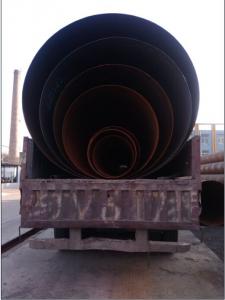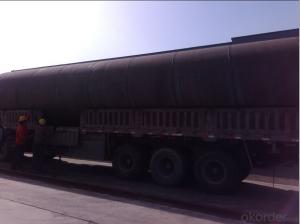SPIRAL STEEL PIPE CARBON ASTM/ API/JIS/ DIN
- Loading Port:
- China Main Port
- Payment Terms:
- TT OR LC
- Min Order Qty:
- -
- Supply Capability:
- -
OKorder Service Pledge
OKorder Financial Service
You Might Also Like
Packaging & Delivery
Packaging Detail: | standard export packing or as customer's requirement |
Delivery Detail: | within 10 - 30 days |
Specifications
Spiral Welded Steel Pipes and Tubes
1.Material:Q195-Q235
2.Length:1-12m
3.WT:1.0-14mm
4.O.D.:20-273mm
Spiral Welded Steel Pipes and Tubes
Product Description:
1.Material : Q235,Q345,L245,L290,L360,L415,L450,L485,GrB,X42,46,X52,X56,X60,X65,X70,X80,X100
2,Standard: SY/T5037-2000,GB/T9711-2011,API Spec 5L PSL1/PSL2,ASTM A252\A53,ISO3183,DIN17172,EN10217,JIS G3457,AWWA C200,ASTM A139,ASTM A671,ASTM A672
3.Wall thickness: 3.0mm-30mm
4.Outer diameter: φ168mm-3020mm
5,Length: 5m-12m or as your requirement
6,Corrosion protection standard: DIN30670,DIN30671, AWWAC210, AWWA C203, SY/T0413-2002,SY/T0414-2002
7,Application: Oil, gas, natural gas, water pipe, thermal electricity pipe, steel structure engineering, etc
Q195-q345 Material Steel Pipe's Materials
Elements | Chemical Compsition% | Mechanical Property | ||||||
| C% | Mn% | S% | P% | Si% | Yield Point (Mpa) | Tensile Strength(Mpa) | Elongation |
Q195 | 0.06-0.12 | 0.25-0.50 | <0.050 | <0.045 | <0.030 | >195 | 315-430 | 32-33 |
Q215 | 0.09-0.15 | 0.25-0.55 | <0.05 | <0.045 | <0.030 | >215 | 335-450 | 26-31 |
Q235 | 0.12-0.20 | 0.30-0.70 | <0.045 | <0.045 | <0.030 | >235 | 375-500 | 24-26 |
Q345 | <0.20 | 1.0-1.6 | <0.040 | <0.040 | <0.55 | >345 | 470-630 | 21-22 |
- Q:Can steel pipes be used for water supply networks?
- Yes, steel pipes can be used for water supply networks. They are commonly used due to their durability, strength, and resistance to corrosion. However, proper coatings and maintenance are necessary to prevent rusting and ensure the quality of the water supply.
- Q:What place must use galvanized steel pipe to make lighting line?
- Galvanized steel is widely used in construction, machinery, coal, chemical industry, railway vehicles, automobile industry, highway, bridge, container, sports facilities, agricultural machinery, petroleum machinery, prospecting machinery and other manufacturing industries.
- Q:Are steel pipes suitable for industrial applications?
- Steel pipes are an excellent choice for industrial applications. They come with several advantages that make them the preferred option in various industries. Firstly, their strength and durability are exceptional, enabling them to withstand high pressure and heavy loads. This makes them perfect for transporting liquids, gases, and solids. Furthermore, steel pipes exhibit high resistance to corrosion, a critical feature in industrial settings where exposure to harsh chemicals, moisture, and extreme temperatures is common. Their corrosion-resistant properties ensure a longer lifespan and reduce the need for frequent maintenance and replacements. Additionally, steel pipes have a smooth interior surface, minimizing friction and allowing for efficient material flow. This is particularly vital in industries like oil and gas, where the smooth flow of fluids is essential for proper operations. Moreover, steel pipes offer a wide range of sizes and thicknesses, allowing for customization and flexibility in design. They can be easily welded and connected, facilitating simple installation and modification as per specific industrial requirements. Overall, steel pipes provide a combination of strength, durability, corrosion resistance, and versatility, making them highly suitable and widely used in various industrial applications such as oil and gas, construction, water treatment, power generation, and chemical processing.
- Q:What are the factors that affect the pressure rating of steel pipes?
- There are several factors that can affect the pressure rating of steel pipes. These include the material and grade of the steel used, the wall thickness of the pipe, the diameter of the pipe, the temperature at which the pipe will be operating, and the type of fluid or gas being transported through the pipe. Additionally, factors such as corrosion, external loads, and installation methods can also impact the pressure rating of steel pipes.
- Q:How do steel pipes compare to other types of piping materials?
- Steel pipes are highly durable and have excellent strength, making them superior to other types of piping materials in terms of longevity and resistance to extreme conditions. They are also more cost-effective, as steel pipes require less maintenance and have a longer lifespan. Additionally, steel pipes have better corrosion resistance, making them ideal for various applications, especially in industries where chemical exposure is common.
- Q:How do steel pipes handle expansion and contraction?
- Steel pipes handle expansion and contraction through their inherent elasticity and ability to withstand high temperatures. When exposed to heat, steel pipes expand due to thermal expansion, and when cooled, they contract due to thermal contraction. This expansion and contraction are accommodated by the flexibility of the steel material, allowing it to withstand the changes in size without significant damage or deformation. Additionally, proper installation techniques such as the use of expansion joints and loops can also help accommodate the expansion and contraction of steel pipes, ensuring their integrity and longevity.
- Q:How big is the seamless steel tube of DN50?
- DN refers to the nominal diameter, the outer diameter is 60.3mm
- Q:What are the different types of steel pipe valves?
- There are several types of steel pipe valves, including gate valves, globe valves, ball valves, check valves, and butterfly valves. Each type of valve serves a specific purpose and has its own unique features and applications in various industries.
- Q:What is the electrical conductivity of steel pipes?
- The electrical conductivity of steel pipes is relatively low, as steel is a poor conductor of electricity.
- Q:Can steel pipes be used for heat transfer applications?
- Yes, steel pipes can be used for heat transfer applications. Steel is a good conductor of heat, making it suitable for transferring heat from one place to another. Steel pipes are often used in various heat transfer systems, such as in heating, ventilation, and air conditioning (HVAC) systems, as well as in industrial applications where heat needs to be transported efficiently.
1. Manufacturer Overview |
|
|---|---|
| Location | |
| Year Established | |
| Annual Output Value | |
| Main Markets | |
| Company Certifications | |
2. Manufacturer Certificates |
|
|---|---|
| a) Certification Name | |
| Range | |
| Reference | |
| Validity Period | |
3. Manufacturer Capability |
|
|---|---|
| a)Trade Capacity | |
| Nearest Port | |
| Export Percentage | |
| No.of Employees in Trade Department | |
| Language Spoken: | |
| b)Factory Information | |
| Factory Size: | |
| No. of Production Lines | |
| Contract Manufacturing | |
| Product Price Range | |
Send your message to us
SPIRAL STEEL PIPE CARBON ASTM/ API/JIS/ DIN
- Loading Port:
- China Main Port
- Payment Terms:
- TT OR LC
- Min Order Qty:
- -
- Supply Capability:
- -
OKorder Service Pledge
OKorder Financial Service
Similar products
New products
Hot products
Related keywords






























